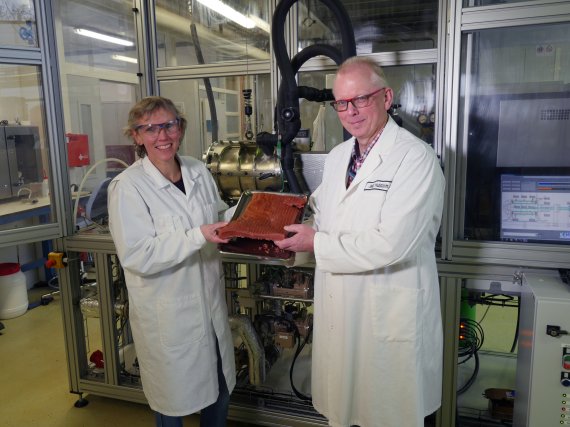<Jacqueline Berghout and Jaap Hulstein with a vegetarian steak; photo: Ergo Mediaproducties>
The shear cell technology transforms vegetal proteins into fibrous structures that are not inferior to meat in either appearance or texture. Vegetal proteins from soy or wheat are put into a device where the proteins are heated to a temperature between 100 and 140 degrees Celsius for twenty minutes, explains researcher Atze Jan van der Goot. Because of the way fluid flows in the device, the proteins align, causing a fibrous structure to be formed. ‘The water does not evaporate, as the device works like a pressure cooker’, tells the researcher.
Sustainable
WUR developed this process in the past six years and presented the results eighteen months ago as an alternative for the current meat substitute production methods, such as extrusion. The advantage of the shear cell technology is that it is simpler and more sustainable: thanks to the limited processing, the nutritional value remains high and the energy costs are lowered. In the last few years, Van der Goot, Professor holding a personal Chair in Sustainable Protein Structuring, and his group have developed a prototype that can produce seven kilogrammes of meat substitute per cycle.
Industrial scale
In the new project called Plant Meat Matters, which is financed by the top sector Agri&Food, the researchers will collaborate with eight food companies on preparing the process for applications at industrial scale. ‘In four years, the first version of a production line will be ready, which companies will be able to use to produce large volumes of tasty meat substitutes’, says Van der Goot. ‘Products like a 100% vegetal steak. We could use this to help the market for meat substitutes grow further, as it is currently at a mere 2 percent of the meat market.’
The participating companies are multinationals such as Unilever, Meyn Food Processing and Avril Group, but The Vegetarian Butcher is also joining in. The companies are contributing 50 percent of the research project’s budget that totals at almost 6 million euros.
PhD candidates
In the next four years, WUR can annually spend a million euro on additional research into meat substitutes. There will be five new PhD positions for research into new vegetal materials for meat substitutes, a sustainability analysis and improvement of the raw soy produce. One researcher will also look into the possibilities of vegan dog and cat food. Van der Goot: ‘That is more complicated than one might think. For humans, the nutritional value of the meat substitute is less critical, as we also eat other products. For a dog or a cat that is only given its food, that nutritional value is far more important.’
Butcher
Van der Goot expects that the new technology can be applied at both small and large scale. ‘The local butcher might want 100 kilogrammes of meat substitute each day, a food processing plant might want a metric tonne per hour, and a gourmet restaurant that wants to produce its own meat substitute might be happy with five kilogrammes per day. We are looking for solutions at each of these scales.’
Additional reading (in Dutch):
‘Toekomstige vleesvervanger kan duurzamer’

